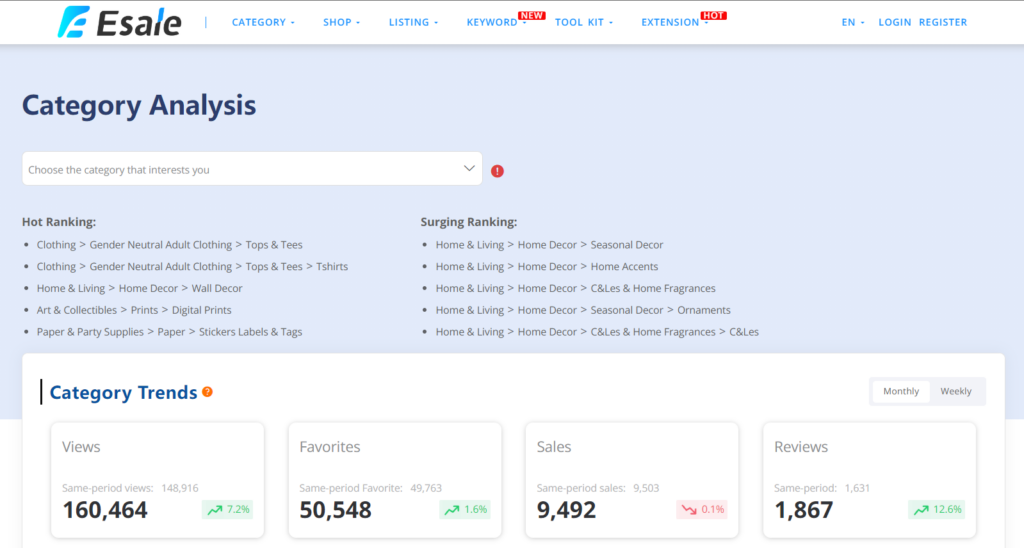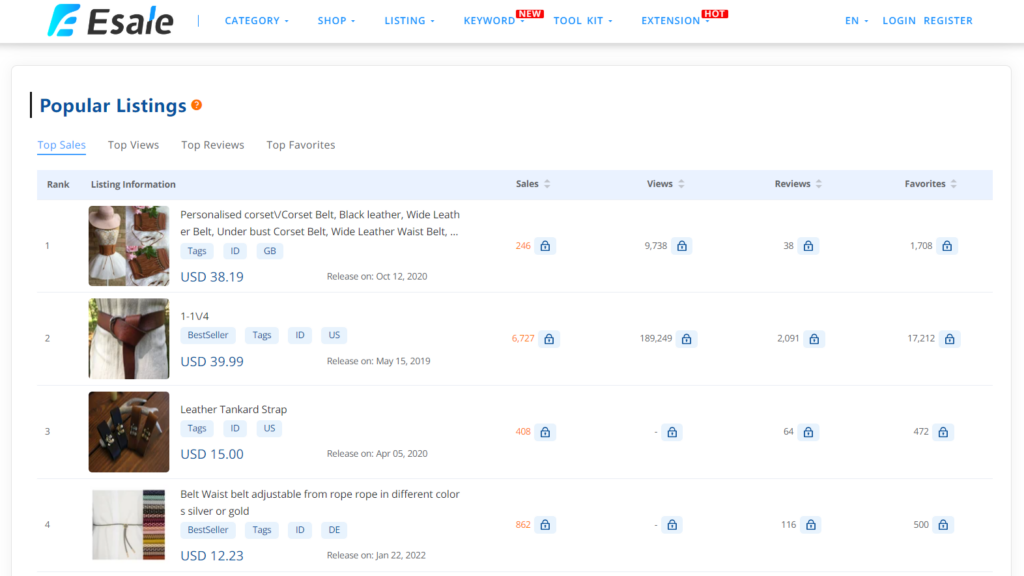How to do Etsy shop category analysis

Here are the steps to conduct Etsy shop category analysis:
- Collect Data: Start by collecting relevant data related to your Etsy shop, including sales records, product listings, page views, favorites, etc. You can export this data using Etsy's seller dashboard or other analytical tools.
- Organize the Data: Organize the collected data into a format that is easy to analyze, such as a spreadsheet. Ensure the accuracy and completeness of the data.
- Segment Categories: Divide products into different categories based on common features, functions, or target customers. Categories can be based on product type, materials, themes, etc.
- Analyze Sales Data: Analyze the sales data for each category, including sales revenue, order quantity, sales trends, etc. Compare the sales performance among different categories to identify the top-performing and underperforming categories.
- Analyze Traffic and Favorites Data: Analyze page views, favorite counts, and other relevant data for each category to understand which categories are receiving more attention. This can help you determine which categories are more popular or of interest to potential buyers.
- Compare Seasonality and Trends: Analyze the performance of different categories during different seasons or specific periods, such as holiday sales peaks. Understanding seasonal variations can help you adjust inventory, marketing, and promotional strategies.
- Evaluate Keyword Effectiveness: Examine the effectiveness of the keywords used within each category. By understanding which keywords attract more traffic and conversions, you can optimize category keywords to improve search visibility.

Esale is a powerful tool designed to empower Etsy shop owners with insightful data analytics and optimization features. One of its significant functionalities is Category Analysis, allowing users to dissect and analyze their product categories for enhanced decision-making and improved shop performance. In this overview, we will delve into Esale's Category Analysis function and its capabilities.
Esale's Category Analysis Functionality:
- Category Performance Overview: Esale provides a detailed performance overview of each product category within an Etsy shop. Shop owners can access key metrics such as sales, views, favorites, and conversion rates specific to each category. This allows for a comprehensive understanding of how well each category is performing.
- Category Comparison: The tool allows direct comparison of the performance of different categories. Shop owners can analyze and compare sales, traffic, and customer engagement for each category, facilitating identification of high-performing categories and areas for improvement.
- Seasonal and Trend Analysis: Esale enables users to analyze category performance during different seasons or specific trends. Understanding how categories perform in varying market conditions aids in making informed decisions regarding inventory management, marketing strategies, and promotions.
- Keyword Optimization for Categories: Effective keyword usage within product categories is vital for improving search visibility. Esale assists shop owners in optimizing category keywords by suggesting relevant keywords and evaluating their performance. This enhances category discoverability and attracts targeted traffic.
- Financial Insights by Category: Esale offers financial analytics specific to each category, including revenue generated, profit margins, and return on investment. Shop owners can assess the financial viability of each category and make data-driven decisions regarding resource allocation and marketing investments.
- Product Diversification Guidance: Through thorough category analysis, Esale provides insights into opportunities for product diversification. Shop owners can identify categories with growth potential and plan for product expansion or diversification to cater to a broader customer base.
- Continuous Monitoring and Optimization: Esale facilitates ongoing monitoring of category performance, allowing shop owners to continuously optimize their product categories based on evolving market trends, customer preferences, and competitive landscape. This iterative approach ensures a competitive edge in the Etsy marketplace.






